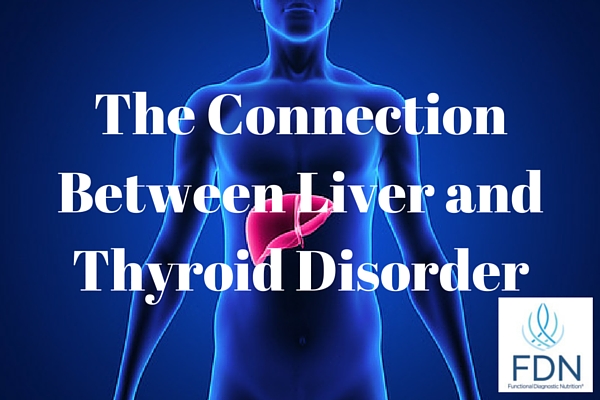If you read What Your Doctor May Not Tell You About Thyroid Disorder, then you know that classic thyroid symptoms such as weight gain, cold hands and feet, low energy and fatigue, dry skin, brain fog, poor memory, depression, hair loss, and digestive issues might not be caused by the thyroid at all. While these symptoms can be caused by issues with the thyroid, they can also be the result of an imbalance. Imbalances in the gut, the liver, the brain, the adrenal glands, even the individual cells of your body – or any combination of those can also contribute. It is important however, to look at the connection between liver and thyroid disorder and secondary thyroid conditions.
A secondary thyroid condition is where the thyroid, itself, is functioning normally, but dysfunction is present in other areas of the body due to chronic stress, inflammation, congestion, or toxicity. This can result in less than optimal amounts of thyroid hormone being produced or available to the cells. As a result symptoms can present identically to an improperly functioning thyroid.
Believe it or not, the liver is a major player in maintaining the optimum levels of usable thyroid hormone. How? Let’s take a look at a little science.
A healthy thyroid produces two types of thyroid hormone, T4 and T3. It produces T4 in larger amounts than the T3, yet T3 is the ONLY form of thyroid hormone that the cells can use. T4 must be converted to T3 before it can be used by the cells. Guess where that conversion takes place? That’s right! In the liver!
It’s a pretty simple process. T4 is made up of one molecule of tyrosine (a protein) and four molecules of iodine. In the conversion of T4 to T3, one molecule of iodine is taken away. The newly formed T3 is then set out into the bloodstream to have its effect on every cell in the body. If this conversion doesn’t happen properly, the shortage of usable thyroid hormone will result in poor metabolism and a variety of symptoms. It’s important to remember, thyroid hormone is the essential “fuel” that allows every cell in your body to do its job efficiently.
The second function of the liver as it relates to thyroid hormone is binding. The liver produces a substance called thyroid binding globulin that “binds” up the thyroid hormone. This prevents it from being absorbed into the cells immediately surrounding the thyroid gland. It puts the thyroid hormone in safe storage for transport to other areas. If the liver produces too much of this binding globulin, then there will not be enough free T3 circulating, and thyroid hormone levels will appear low. Conversely, if too little is created, then too much free T3 will be circulating, making thyroid levels appear high.
Why is too much T3 not a good thing? If the cells are bombarded with too much T3 at too fast a pace, the thyroid hormone receptor sites in each cell become resistant rather than receptive to T3. This starves the cell of its much needed thyroid hormone. Our miraculous body has regulatory safeguards built in to prevent this resistance from happening. One of these safeguards is the production of the binding globulin in the liver.
Another safeguard also takes place in the liver. This is the production of RT3, or reverse T3. Just like it sounds, it is essentially the opposite of T3, specifically designed to balance out levels of T3 in the body.
Liver congestion or dysfunction can lead you to believe that you have a thyroid condition. However, a thyroid blood test may show that your thyroid is producing the correct amount of hormones. And your medical doctor may tell you “everything looks normal.”
This must be translated as; “everything on the thyroid hormone test” looks normal. Further investigation is needed.
Because of the connection between liver and the thyroid, it is vital to optimize the body’s detoxification pathways. A healthy diet of whole foods and regular exercise is a vital part of reversing this issue. Working with a functional health coach can help you to find the right foods to support a healthy liver and thyroid. A functional health coach can also guide you to the right lifestyle changes to help restore optimal liver and thyroid function.
© Science Pics | Dreamstime.com – Liver








